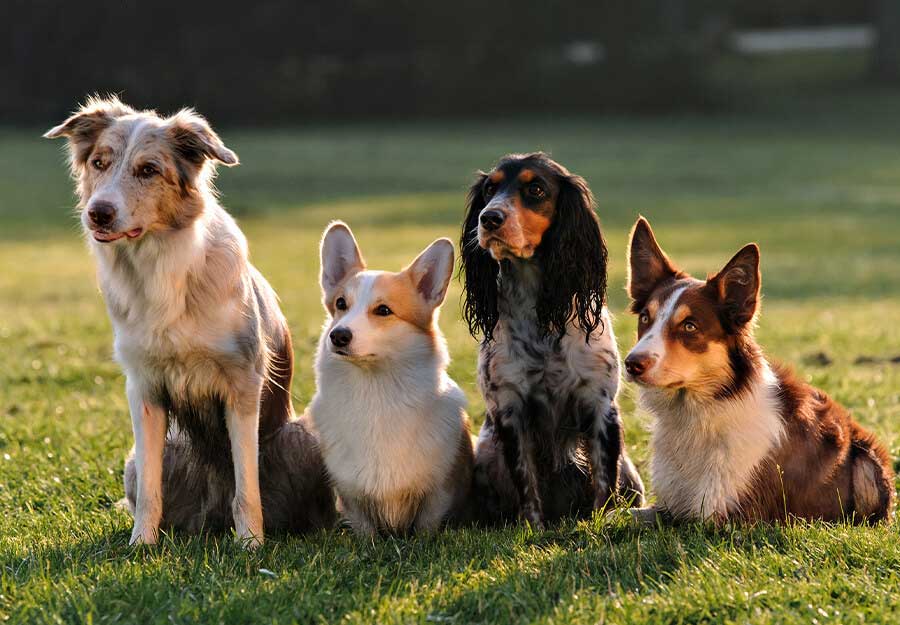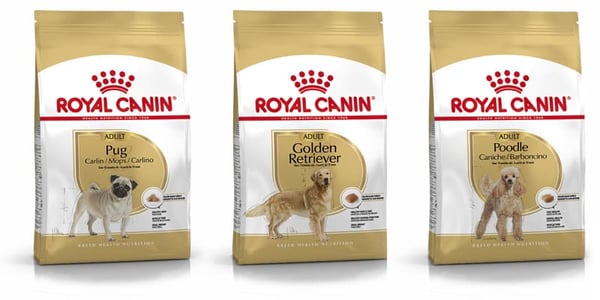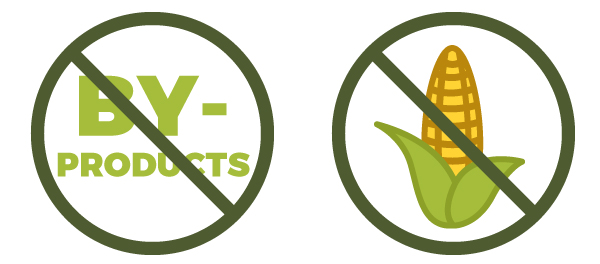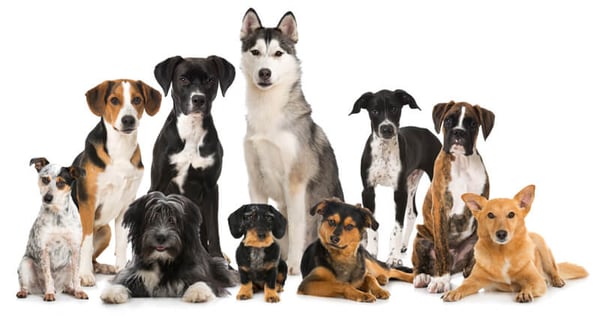
Should you be feeding a breed specific dog food? Let's explore the pros and cons of breed specific foods so that you can make the best choice for your dog.
Every dog is different. From their goofy sleeping positions to the way they wiggle when you call their name, their unique personalities are what make them so special.
When it comes to dog food, you need to consider a different set of traits to determine the most appropriate diet. Your dog's breed can help you better understand some of his nutritional needs and how you can better care for him.
You want a high-quality brand that keeps them happy and healthy, and your dog’s breed can shed some light on their nutritional needs based on his size, metabolism, and any common health conditions they might develop as they age.
Check out our Beginner's Guide to Dog Food to find out what your dog needs and how to pick the food that is best for their unique needs.
How Important is Breed?
Your dog's breed can obviously determine their appearance, but it can also influence their temperament, build, activity level, and dietary needs. This could mean that a dog with a sturdy build and high activity level, for example, may benefit from a different diet than a dog with a smaller stature and lower activity level.
Every breed has different genetic traits that can determine metabolism and predispositions for disease and age-related issues. Finding the right diet for your breed can help to reduce or prevent these problems by offering the right nutrients to support your dog’s overall health.
There are not a crazy amount of breed-specific dog food brands on the market, though. Among the few, one brand in particular that has a wide range of options is Royal Canin Dog Food. This vet-recommended food has been a popular choice among dog owners with purebreds or pooches that require a specialized diet for decades.
Is it really necessary or better for your pet to go with a breed-specific brand like Royal Canin Dog Food? In this article, we’ll discuss the benefits and drawbacks of Royal Canin and how you can decide if it’s right for your dog.
Benefits of Royal Canin Dog Food
Royal Canin dog food has been around for quite a while - 52 years, to be exact! Starting back in 1968, it has kept up with the various changes in dog food trends and requirements and has not lost its competitive edge as a brand. It comes with many veterinarians’ stamp of approval.
While it isn’t always necessary to choose a breed specific dog food like Royal Canin, it can be helpful to narrow down your options. If you’ve ever browsed the never-ending aisle of dog food before at your local pet store, you can understand why this is a major plus! Let’s explore the benefits of Royal Canin.

1. It takes into account the unique requirements of your dog’s breed.
Royal Canin Dog Food has dominated the breed specific food category. That’s because they do it exceptionally well. Each of their purebred food lines are carefully and thoughtfully crafted with the breed’s biology in mind to provide them with the nutrition they need.
For example, Dachshunds are typically a high energy breed but they tend to overeat and are prone to back and joint issues later in life due to their stature. The Royal Canin dog food for Dachshunds has been designed to provide them with the nutrients needed to maintain their health and possibly prevent these common ailments.
The kibble is shaped in a way that accommodate their narrow and compact jaw, while the caloric content and nutrients are well-suited for their activity level and support their overall health and mobility.
On the other hand, the formula for Royal Canin dog food designed for Rottweilers is somewhat different. It takes into consideration the Rottweiler’s strong jaw, which requires a different kind of kibble by size and texture.
Royal Canin’s Rottweiler food provides nutrients that support heart health since they are susceptible to cardiac disease and tailored protein levels to prevent unnecessary weight gain and mobility issues.
Royal Canin dog food has specific formulas for the following breeds:
-
- Beagle
- Bichon Frise
- Boxer
- Bulldog
- Cavalier King Charles Spaniel
- Chihuahua
- Cocker Spaniel
- Dachshund
- Dalmatian
- French Bulldog
- German Shepherd
- Golden Retriever
- Great Dane
- Jack Russell Terrier
- Labrador Retriever
- Maltese
- Miniature Schnauzer
- Poodle
- Pug
- Rottweiler
- Setter
- Shih Tzu
- West Highland White Terrier
- Yorkshire Terrier
In addition to their breed specific options, Royal Canin is offered in all-breed formulas to meet the nutritional needs of different life stages and mild health conditions, like sensitive skin or digestion. Click the link below to see all Royal Canin formulas.

2. It is great for dogs with specialized diets for health conditions.
You may have seen Royal Canin Dog Food for sale in the waiting room of your veterinarian’s office. This is because the company has collaborated with vets across the globe to create therapeutic formulas that work great for dogs with specific dietary needs.
If your pooch has a particular health condition and needs to follow a special diet, you might find the right solution with one of Royal Canin’s prescription formulas. The company has developed several different recipes that address the following ailments our dogs can experience:
- Allergies
- Digestive problems
- Diabetes
- Bone and joint issues
- Urinary tract issues
- Liver problems
- Weight management
- Cardiac disorders
- Recovery from surgery
These diets are not breed specific but are prescribed by vets to solve dog food specific to breed problems. Royal Canin’s vet line, Medi-Cal, is often meant to be fed temporarily to provide relief from a particular issue.
Once the underlying problem is diagnosed and addressed, it may be possible to transition your dog back to a non-prescription, breed specific version of the food at your vet’s recommendation, of course.
Drawbacks of Royal Canin Breed Specific Dog Food
Now that you understand the benefits of choosing a breed-specific brand like Royal Canin, let’s discuss the drawbacks. You’re buying food for your best friend, after all. You must weigh all your options and consider the pros and cons.
1. It has some controversial and unnatural ingredients.

Some of the ingredients in royal canin brand dog food are controversial amongst dog owners and pet food critics. The main source of animal protein comes from chicken by-products, which many would argue is not the highest quality option.
Corn is another controversial ingredient that is commonly used in royal canin special dog food formulas. However, Royal Canin does contain favourable ingredients, such as fish oil and chicken fat.
The bottom line is if you’re looking for dog food with the most natural and wholesome ingredients, Royal Canin may not be for you.
Avoiding unwanted ingredients in dog food can be tough. Take a look at our list of 24 Bad Dog Food Ingredients to help you avoid foods that aren't as healthy as they claim to be.
2. Some dog owners claim that their dogs don’t like the flavour.
After hearing from other dog owners and reading reviews online, one common drawback we’ve seen is that it lacks enough flavour to win over their dogs’ taste buds. This is likely due to the lower protein and meat content.
Now, we know dogs can’t speak to tell us what they like and don’t like (if only they could!), but it’s easy to tell when your dog is not a fan of their food. If your pooch is a picky eater, he may turn his nose up at Royal Canin breed specific.
3. Breed specific foods might not be suitable for crossbreeds.
Thanks to the hard work of rescues and shelters, the good old Heinz 57 is much more common in Canadian households than a purebred. So much so that they have actually topped the list of the most popular Canadian dog breeds.

Though breed specific diets may be well suited for a purebred pup, choosing the right food for a crossbreed, or mystery breed may be challenging. They may have a mix of characteristics, or the cross breeding may have eliminated certain traits that the the breed specific foods are designed to support.
In these cases, feeding an all-breed diet will be the most suitable option to support their dietary needs. Royal Canin offers a variety of all breed diets, but look at all your options to find the right brand and formula for your pooch. Check out What Should I Feed My Dog to help you look closer at your options and find the best fit for your dog's nutritional needs.
In Conclusion
As mentioned above, it isn’t necessarily better or required to go with a breed specific dog food. When choosing the right brand for your buddy, the general rule is to consider their size, activity level, and health requirements before anything else.
If a breed specific brand of dog food, such as Royal Canin Dog Food, checks all the boxes for your purebred pup, right on! Many dog owners around the globe are super happy with this product, and their dogs love it too.
Whether you have a small breed, large breed, medium-sized breed, or if your pooch has some other special dietary needs, Royal Canin probably has something for you and your furry friend.
As long as you do your research and make sure that you have a clear understanding of your dog’s nutritional needs, you’ll be able to make the best decision for what’s right for your pet!
Frequently Asked Questions
Should I get breed specific dog food?
Not every dog needs breed specific food, but it's important to consider their overall health needs when choosing. If your dog is showing signs or is at high risk of certain breed conditions, talk to your vet about the pros and cons of choosing a breed specific diet.
Who makes breed specific dog food?
Royal Canin is one of Canada's most well-known and top-rated breed-specific dog food brands. They offer an extensive line of breed, size, and life stage-specific formulas to help you offer the tailored nutrition your pet needs to thrive.
Can't I just give my dog any commercial pet food?
While many commercial pet foods are available, not all of them provide the appropriate balance of nutrients for dogs. It's important to choose high-quality dog food that has been formulated and tested to meet the nutritional standards set for your dog.
Which dog breeds benefit most from breed specific dog food?
Certain breeds have more unique and likely health issues that breed specific foods can help prevent or reduce the chances of. Bulldogs, German Shepherds, Poodles, and Shih Tzus are some breeds for which you'll find breed-specific formulas.
.png?width=200&height=66&name=logo%20(1).png)


